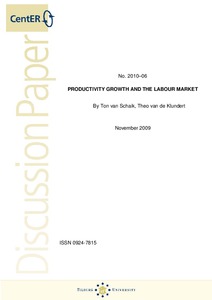Productivity growth and the labour market
"The productivity slowdown in Europe since the mid-1990s is a reason for concern. Labour market rigidity, hampering innovation, may be a cause of the slowdown. In the paper this argument is placed in a broader perspective. Labour force participation is an important factor in explaining differen...
| Main Authors: | , |
|---|---|
| Institution: | ETUI-European Trade Union Institute |
| Format: | TEXT |
| Language: | English |
| Published: |
Tilburg
2009
Tilburg University |
| Subjects: | |
| Online Access: | https://www.labourline.org/KENTIKA-19185344124919035269-Productivity-growth-and-the-la.htm |
| Summary: | "The productivity slowdown in Europe since the mid-1990s is a reason for concern. Labour market rigidity, hampering innovation, may be a cause of the slowdown. In the paper this argument is placed in a broader perspective. Labour force participation is an important factor in explaining differences in productivity and welfare over time and across regions as can be illustrated by comparing the US and the EU-15. Moreover, technological change is not entirely exogenous. Dynamic increasing returns as introduced by Kaldor and Verdoorn may boost productivity. For countries other than the US catching up appears to be of importance. The question is then to what extent labour market institutions account for productivity growth. Regression analysis on a panel of 21 OECD countries covering the period 1960-2005 reveals that employment protection is relevant but that the impact is qualitatively different before and after 1980. The reason is that in the first sub-period technological change is driven in most countries by imitation, whereas in the second sub-period innovation becomes the predominant factor everywhere." |
|---|---|
| Physical Description: | 21 p. Digital |

